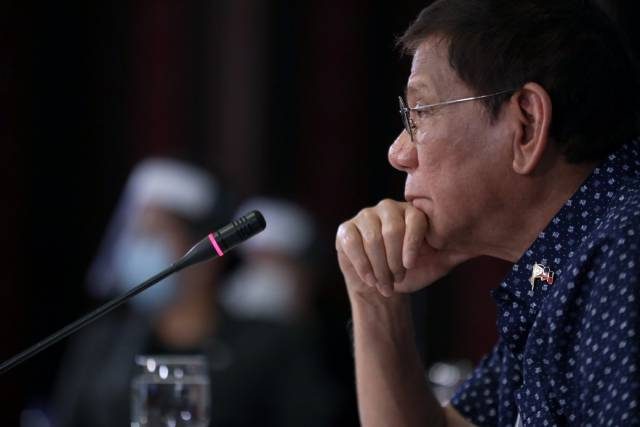President Rodrigo Duterte just recently considered that the number one problem of the country is the COVID-19 amid the continuing rise of cases and nearly four months into the quarantine measures to supposedly contain its spread.
During his national address that aired on Tuesday morning, Duterte vented out his anger toward COVID-19.
“My countrymen, we continue to meet regularly to talk about our problem. Perhaps our number one problem today is the COVID,” he said.
“I am as mad as you. Galit ako, pareho tayo sa nangyari,” he added.
Duterte also rambled his eagerness to fully open the economy, citing that he is only being hindered by “science.”
The country is currently experiencing surge in the number of COVID-19 cases since the national government approved in the partial resumption of work last June.
“And ginusto ninyo na buksan ko na ang puwerta. Gusto ko ‘yan, gusto ko. Ang nagpipigil na lang sa akin ang science. Gusto ko kasi nagalit na pati ako nakulong ng ilang buwan. Naging inutil na rin ako eh. I have become — except for the voluminous papers, na inutil na ako, wala na akong magawa na… Ewan ko. But you know, COVID is COVID,” he said.
Duterte’s past speeches mostly tackle quarantine recommendations of the Inter-Agency Task Force for Emerging Infectious Diseases, the body assigned to handle the government’s response efforts to the pandemic, strengthening security presence during the lockdown and off-the-cuff threats to quarantine violators.
He initially placed Metro Manila in community quarantine last March 15, and then expanded the directive to entire Luzon on March 17. Other provinces and regions with COVID-19 cases also implemented their own protocols among the residents.
On May 16, the national government partially eased the protocols to the modified ECQ version, wherein some non-leisure industries were allowed to resume at limited capacity.
Most regions later shifted to the general community quarantine last June 1.
As of July 22, the Department of Health recorded 72,269 confirmed cases, which surpassed the predictions and fears of local researchers in the past months.
Of these, 47,240 cases are active, 23,623 patients have recovered and 1,843 have died.
Perhaps it’s COVID-19?
Following Duterte’s “perhaps” remark, local Twitter and some organizations expressed their dismay in the form of witty posts on the perceived late realization of more than half a year into the health crisis.
The keyword “perhaps” likewise made it to the microblogging platform’s top local trending list.
Some Twitter users merely uploaded a screenshot of a news outlet’s live-tweet into memes implying that the president has been the problem all along.
https://t.co/kdoYVPQCXC pic.twitter.com/U6gT5TTSaP
— just sagittarius things (@scorsaguin) July 21, 2020
Fixed it for you. https://t.co/g7J5olHL4O pic.twitter.com/IP8WpvDnVo
— mayka #SaveLumadSchools (@maykamaykaba) July 21, 2020
The Philippine Center for Investigative Journalism likewise tweeted: “Perhaps our number one problem today is…” with an emoji pointing towards Duterte’s quote.
Perhaps our number one problem today is👇🏽 https://t.co/gYvgBEcVcE
— PCIJ (@PCIJdotOrg) July 21, 2020
Facebook page Voice of Millennials, meanwhile, argued that this should have been the priority since the first detected case last January.
“Sir, noong January pa. Ngayon mo lang nalaman?” the post read.
Sir, noong January pa. Ngayon mo lang nalaman?
Posted by Voice Of Millennials on Monday, July 20, 2020
Leftist group Anakbayan, meanwhile, noted that Duterte might not even be sure because of the word “perhaps.”
“Perhaps”? https://t.co/i07yyk4UTN pic.twitter.com/geuPlTCxJz
— Anakbayan (@anakbayan_ph) July 21, 2020
Local artist Tarantadong Kalbo also created a funny comic strip about the president’s statement and shared it online.
p e r h a p s 💔 pic.twitter.com/EoneI1r7YO
— Tarantadong Kalbo (@KevinKalbo) July 21, 2020
Blogger Noemi Dado, meanwhile, speculated that Duterte had been busy with other things such as the rejection of ABS-CBN’s franchise and passage of the controversial Anti-terrorism Act of 2020 into law, which took effect last Saturday, June 18.
Wow , Duterte just realised it now. Too busy with the denial of Abs-cbn franchise , passing the anti- terrorism law , and many more. Focus. The enemy is the #coronavirus https://t.co/aqGE9tbSrb
— Noemi L. Dado (@momblogger) July 21, 2020
The current COVID-19 situation is what local scientists and the medical sector feared the country would reach when the national government just started imposing stringent measures to supposedly curb its spread here.
During the ECQ period from March to May, the public had been calling on the government to perform health-oriented solutions and strategies such as ramping up the testing programs, aggressive contract tracing and improving the public health system.
However, despite the hefty budget Congress granted last March, the government only managed to perform these responsibilities after the spike of cases last May.
In the same month, the counter-insurgency measure suddenly slipped into the passage and eventually signed into law, and ABS-CBN’s application for franchise renewal was deliberated on into lengthy hearings and subsequently denied.
Prior to Metro Manila’s shift to GCQ, researchers from the University of the Philippines warned the government against the “premature” lifting of restrictions in the region due to the high concentration in the number of infected residents.
They recommended the extension of MECQ in the National Capital Region and other high-risk areas until the Department of Health has successfully increased its testing capacity and resolved its data issues.
Palace also confused the terms “mass testing” and “expanded targeted testing,” which was one and the same in the first place,” to only include health workers and other vulnerable Filipinos.










